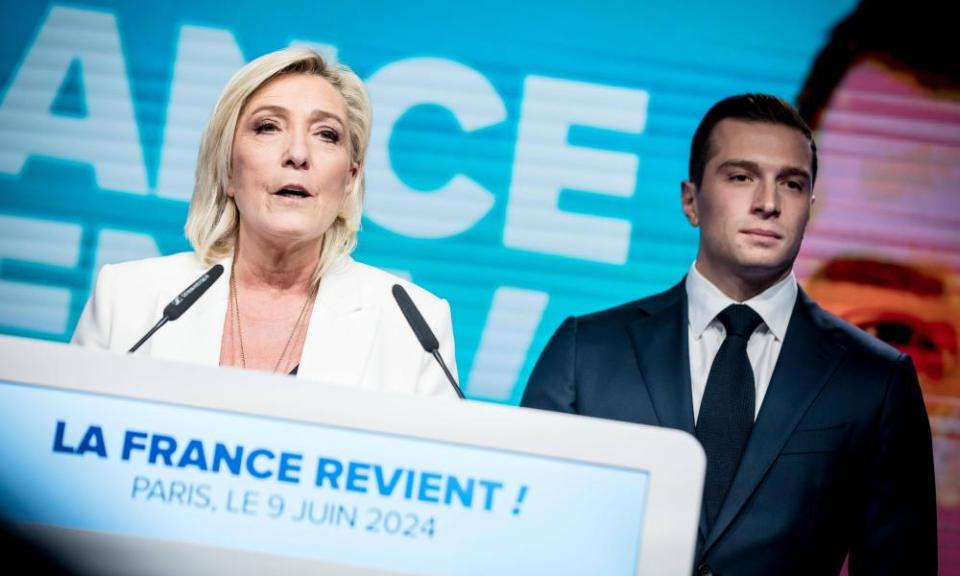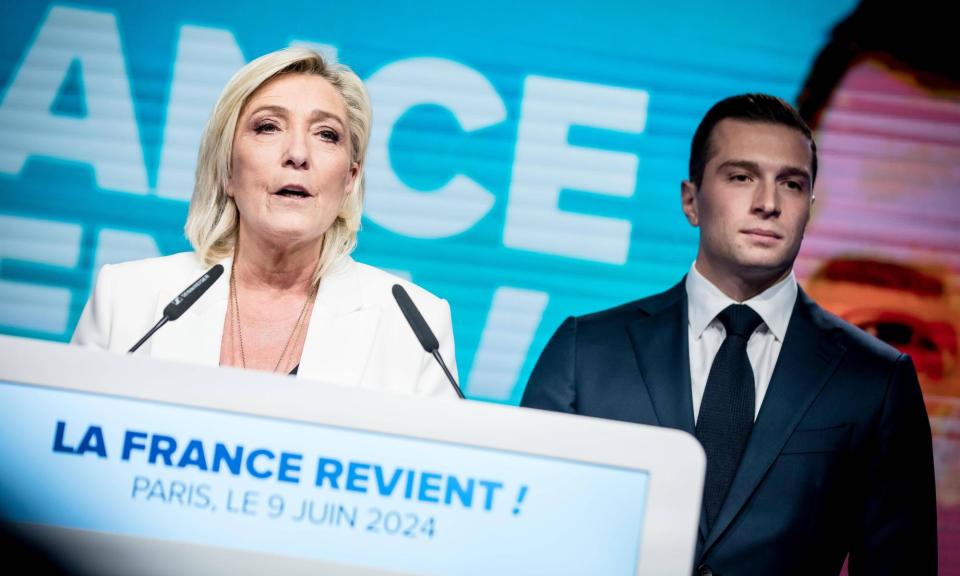French parties hold emergency talks with possible allies for snap election
Political parties in France held emergency talks to sound out potential allies on Monday as the country braced for its most consequential legislative election in decades, called by Emmanuel Macron after being roundly defeated by the far right in the European parliamentary elections.
The National Rally (RN) won about 32% of the vote on Sunday, more than double the 15% or so scored by the president’s allies, according to exit polls. The Socialists on 14% came within a whisker of the Macron group.
Macron’s Renaissance party has 169 deputies in the national assembly and the RN 88.
The unexpected and risky decision to hold an election so soon could hand major political power to the far right after years on the sidelines and neuter Macron’s presidency three years before it ends. If the far-right party wins an outright majority, the president would in effect lose control over most French domestic policy.
Related: European election results 2024: live from across the EU
“This will be the most consequential parliamentary election for France and for the French in the history of the Fifth Republic,” the finance minister, Bruno Le Maire, told RTL radio. “We must fight for France and for the French. We have three weeks to campaign and convince the French.”
Emmanuel Pellerin, a Renaissance party MP, said he and his colleagues were “still in shock”, adding: “Everything points to the RN winning a relative or absolute majority. But that forces the French to think about what is at stake.”
The legislative vote will take place on 30 June, less than a month before the start of the Paris Olympics, with a second round on 7 July. The results are likely to depend on how committed leftwing and centre-right voters are to keeping the far right away from power.
The president’s move caught some far-right leaders off guard. “We didn’t think it would be immediately after the European elections, even if we wanted it to be,” the RN deputy chair, Sébastien Chenu, said on RTL Radio. “Elections are rarely a gift and in this context they aren’t.”
He called for rightwing lawmakers from outside the RN to swell its ranks in its battle to beat Macron, and said the party’s telegenic president, 28-year-old Jordan Bardella, would be its candidate for prime minister.
Bardella’s mentor, Marine Le Pen, who was runner-up in the last two presidential elections, has remained party leader in parliament and is largely expected to run again in 2027.
Bardella, Le Pen and Le Pen’s niece Marion Maréchal – who headed the list of the far-right Reconquête party in the EU elections – met at RN’s headquarters on Monday afternoon to discuss a possible electoral coalition.
Early on Monday evening, Bardella said Marechal had “a constructive approach towards the RN” and said he hoped to forge as large a majority as possible. He said: “I’m perfectly prepared to talk to people who share the ambition of bringing some of our ideas to power.”
The leaders of the very divided French left – the hard-left LFI (France Unbowed), Communists, Socialists and Greens – also held emergency talks after Macron’s announcement.
“We don’t have time to procrastinate,” LFI’s Manon Aubry told reporters. “The objective is to be able to meet again, to build the future and above all to go and win.”
Analysts have said an outright far-right majority is unlikely, partly because voters often use European elections as a low-cost way of delivering a kick to the incumbent government, and things may well turn out differently in a parliamentary election.
Macron’s gamble is being seen as an attempt to make the best of his weak position by reclaiming the initiative and forcing the RN into election mode faster than it would have liked. The president will be aiming to rally centrist and leftist voters at a time when there is widespread shock after a far-right surge across the continent.
A source close to Macron said the president was “going for the win”, adding that the idea was to mobilise the voters who had stayed away on Sunday. “There’s audacity in this decision, risk-taking, which has always been part of our political DNA,” the source said.
But another source close to Macron said: “I knew this option was on the table, but when it becomes reality it’s something else … I didn’t sleep last night.”
Announcing his decision on Sunday night, Macron said he could not pretend nothing had happened in the European elections. “I have decided to give you the choice … therefore I will dissolve the national assembly tonight,” he said. The president acknowledged that the decision was “serious and heavy” but called it “an act of confidence”.
He said he had confidence in “the capacity of the French people to make the best choice for themselves and for future generations”, adding: “This is an essential time for clarification. I have heard your message, your concerns, and I will not leave them unanswered … France needs a clear majority to act in serenity and harmony.”
Not everyone was convinced by the move. Yaël Braun-Pivet, a senior figure within Macron’s party who serves as the speaker of the lower house, appeared to express some doubt on Monday morning, indicating that forming a coalition with other parties in the French parliament could have been a better path.
“The president believed that this path did not exist … I take note of the decision,” she told France 2 TV.
Raphaël Glucksmann, who headed the Socialist party’s list, said Macron had “given in” to Bardella. “This is a very dangerous game to play with democracy and the institutions. I am flabbergasted.”
Another critic, Valérie Pécresse, a senior figure in the conservative Les Républicains party, said: “Dissolving without giving anyone time to organise and without any campaign is playing Russian roulette with the country’s destiny.”
The mayor of Paris, Anne Hidalgo, said the decision to send France to the polls just weeks before the capital hosts the Olympic Games at the end of July was “extremely troubling”.
But the head of the International Olympic Committee, Thomas Bach, attempted to play down such concerns, saying the elections were “a democratic process that won’t disrupt the Games”.
He added: “France is used to holding elections and they will do it once again. There will be a new parliament, a new government, and everybody will support the Olympic Games.”
Reuters and Agence France-Presse contributed to this report

 Yahoo News
Yahoo News 

